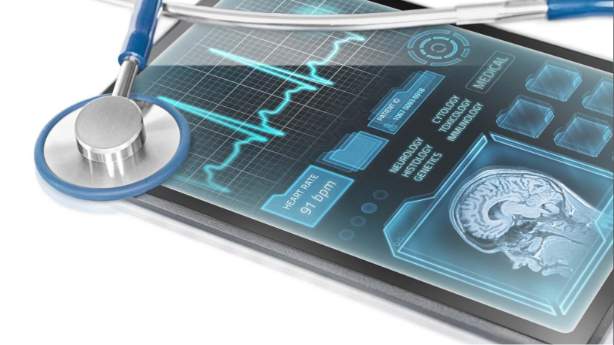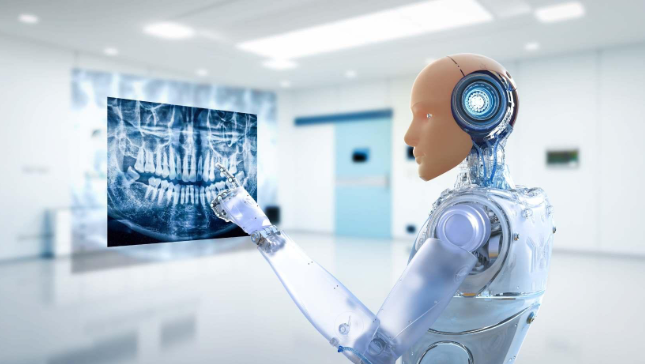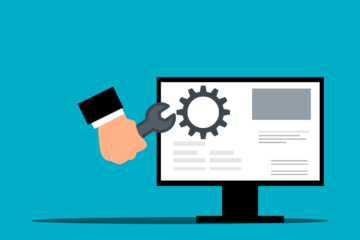Artificial Intelligence (AI) is revolutionizing healthcare with applications that drive efficiency, improve patient outcomes, and streamline clinical processes. From diagnostics to personalized treatments, AI technologies are bringing healthcare into a new era.
Look at these 10 real-life examples of AI in healthcare that are transforming the industry and helping providers meet modern challenges.

How is AI Used in Healthcare?
1. AI in Medical Imaging: Precision Diagnostics for Radiology
AI-powered imaging solutions are rapidly advancing the field of radiology. With tools like deep learning algorithms, AI can analyze complex medical images such as X-rays, MRIs, and CT scans, detecting abnormalities like tumors or fractures faster and with higher accuracy than traditional methods.
Systems like Google’s DeepMind and Zebra Medical Vision are helping radiologists identify life-threatening conditions such as lung cancer, brain tumors, and cardiovascular diseases at early stages, significantly improving patient prognosis.
According to a report by Grand View Research, the global AI in medical imaging market size was estimated at USD 1.01 billion in 2023 and is projected to grow at a CAGR of 34.8% from 2024 to 2030. This rapid growth underscores the increasing reliance on AI for precision diagnostics in radiology.
2. Predictive Analytics for Disease Prevention
Predictive analytics leverages AI algorithms to analyze patient history, genetic information, and environmental factors to predict the risk of developing certain diseases. For instance, Kaiser Permanente uses AI to predict which patients are at a higher risk of diabetes or cardiovascular disease based on lifestyle factors and medical history.
This approach helps healthcare providers tailor preventive interventions, empowering patients to make proactive health choices and reducing the long-term costs associated with chronic diseases.
3. AI for Personalized Medicine and Treatment Plans
AI enables personalized medicine by helping doctors understand individual patient responses to medications and treatments. Platforms like IBM Watson Health are using AI to analyze patient data, identifying optimal treatment paths for cancer patients.
By considering genetic data, past treatment outcomes, and patient preferences, AI systems provide doctors with customized treatment plans that enhance effectiveness and minimize side effects.
4. Virtual Health Assistants for Patient Engagement
Virtual health assistants, such as chatbots and voice assistants, are transforming patient engagement and support. For example, apps like Sensely offer AI-driven virtual assistants that interact with patients, assess symptoms, and provide health advice.
These tools can handle basic health queries, manage medication reminders, and connect patients with the appropriate healthcare services, reducing the workload on healthcare staff and ensuring that patients receive timely information.
Tip: For businesses aiming to leverage AI’s potential in healthcare and beyond, hiring expert AI developers is crucial. App-Scoop stands as a leading AI app development company in Canada and USA dedicated to delivering cutting-edge solutions. From AI mobile app development to web app development, our team utilizes advanced development tools to create customized, high-performance applications tailored to your needs.
Hire AI developers from App-Scoop to ensure your project benefits from state-of-the-art technology and expert insight into the dynamic world of AI.

5. Accelerated Drug Discovery
AI plays a crucial role in accelerating the drug discovery process by simulating drug reactions and analyzing potential compounds at a fraction of the traditional time and cost. For instance, Insilico Medicine uses AI algorithms to identify potential drug candidates for diseases such as cancer and Alzheimer’s.
By automating aspects of the research and testing phases, AI allows pharmaceutical companies to bring new, effective treatments to market faster, benefiting both patients and providers.
6. Enhanced Robotic-Assisted Surgery
In surgical settings, robotic-assisted surgery is enhanced by AI to improve precision and minimize risks. Systems like the da Vinci Surgical System integrate AI algorithms, enabling surgeons to perform complex procedures with higher accuracy and control.
This technology is widely used in minimally invasive surgeries for cardiovascular, urological, and gastrointestinal procedures. AI-driven robotic systems contribute to reduced recovery times, minimized surgical complications, and increased success rates.
Related Articles:
- How Blockchain will Transform the Healthcare Ecosystem?
- Using AI to Improve Electronic Health Records
- AI in Healthcare: Opportunities and Challenges

7. Smart Wearables for Continuous Monitoring
Smart wearables embedded with AI technology enable continuous monitoring of vital signs, helping detect health issues before they escalate. Wearables like Fitbit, Apple Watch, and other AI-enhanced devices track heart rate, oxygen levels, sleep patterns, and physical activity.
Through predictive analytics, these devices provide users with personalized health insights and alert them to potential health risks, encouraging preventive action. This real-time monitoring is particularly beneficial for managing chronic conditions like diabetes and heart disease.
8. Remote Patient Monitoring with AI
AI-powered remote patient monitoring systems allow healthcare providers to track patient health data in real time, enabling early intervention when health issues arise. Wearable devices like Fitbit and Apple Watch collect data on heart rate, oxygen levels, and physical activity, while AI algorithms analyze this data for any irregularities.
For chronic condition management, such as diabetes and hypertension, these systems can alert healthcare professionals to potential complications, reducing the need for frequent in-person visits.
9. AI for Mental Health and Behavioral Insights
AI applications in mental health offer innovative ways to support mental well-being and understand patient behavior. Platforms like Woebot use natural language processing (NLP) to engage users in therapeutic conversations, providing cognitive-behavioral therapy (CBT) and emotional support.
These digital mental health tools can identify patterns in user responses, offering insights that help psychologists diagnose and treat conditions like depression and anxiety more effectively.

10. Hospital Operational Efficiency with AI
AI is helping hospitals manage operations efficiently by optimizing resources, staff schedules, and bed management. For example, LeanTaaS’s iQueue system uses AI to optimize surgical scheduling and patient flow, minimizing wait times and improving the quality of care.
AI algorithms can predict patient discharge times, allowing hospitals to better allocate resources and enhance patient care delivery. This application of AI helps hospitals reduce operational costs and improve patient satisfaction.
By integrating AI across these diverse applications, healthcare providers can offer more efficient, precise, and personalized care. The potential for AI in healthcare is boundless, promising transformative improvements in diagnostics, treatment, and patient outcomes.
Frequently Asked Questions
How is AI used in medical imaging?
AI is used in medical imaging to analyze and interpret X-rays, MRIs, CT scans, and other diagnostic images. AI algorithms can detect patterns and anomalies, such as tumors or fractures, often with greater accuracy than human radiologists, helping to speed up diagnosis and improve patient outcomes.
What is AI's role in drug discovery?
AI plays a crucial role in drug discovery by analyzing vast datasets to identify potential compounds that could become new drugs. Machine learning algorithms predict the effectiveness of drugs, optimize clinical trial designs, and speed up the research process, significantly reducing the time and cost of drug development.
How is AI applied in predictive analytics for patient care?
AI is used in predictive analytics to analyze patient data and forecast future health outcomes, such as the likelihood of developing chronic diseases or requiring hospitalization. By identifying at-risk patients early, AI enables healthcare providers to offer preventive care, improving patient outcomes and reducing costs.
Can AI assist in diagnosing diseases?
Yes, AI can assist in diagnosing diseases by processing medical data such as patient history, symptoms, and test results. For example, AI has been used to detect early signs of conditions like cancer, heart disease, and diabetes, providing faster and more accurate diagnoses that lead to timely treatments.
How does AI help in personalized medicine?
AI helps in personalized medicine by analyzing genetic, environmental, and lifestyle factors to create tailored treatment plans. AI algorithms can predict how a patient will respond to certain medications or therapies, allowing for more effective and targeted treatments that improve patient outcomes.
What is the role of AI in robotic surgery?
AI is used in robotic surgery to enhance precision, reduce human error, and enable minimally invasive procedures. AI-powered surgical robots can assist surgeons with real-time data analysis, providing feedback and performing complex movements with greater accuracy, resulting in faster recovery times for patients.
How does AI improve administrative tasks in healthcare?
AI improves administrative tasks by automating processes like scheduling, billing, and patient record management. This reduces the administrative burden on healthcare providers, allowing them to focus more on patient care, while also improving efficiency and reducing human error.
Can AI assist in managing chronic diseases?
Yes, AI assists in managing chronic diseases by continuously monitoring patient data, such as blood sugar levels for diabetes or heart rate for cardiovascular conditions. AI can alert patients and healthcare providers about potential issues, recommend lifestyle changes, and track the effectiveness of treatments in real-time.
What is AI’s role in telemedicine?
AI enhances telemedicine by offering virtual consultations, automating patient triage, and analyzing symptoms to recommend appropriate actions. AI algorithms can also assist doctors during video calls by suggesting diagnoses or treatment options based on patient data, improving the quality of care delivered remotely.
How is AI used in virtual health assistants?
AI-powered virtual health assistants use natural language processing (NLP) to interact with patients, answer health-related questions, schedule appointments, and provide reminders for medication or treatment. These assistants can offer round-the-clock support, making healthcare more accessible and reducing the burden on healthcare staff.



